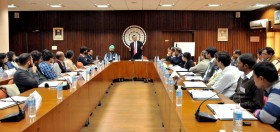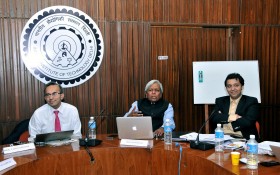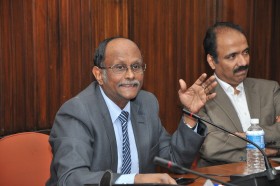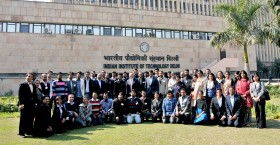SAI and Tata Trusts host workshop on science and technology-based social entrepreneurship
From February 2 to 4, 2016, the Harvard University South Asia Institute (SAI), the Indian Institute of Technology, Delhi, and the Tata Trusts hosted a capacity building workshop on the theme ‘Science and Technology-based Social Entrepreneurship in India’. The event brought together 25 organizations from 14 states pan-India at the Indian Institute of Technology in Delhi. These organizations have been doing noteworthy work on issues like improving access to electricity in rural areas, providing access to education to underprivileged communities, improving sanitation, and developing tech solutions to maximise social impact. They were selected through a rigorous process from among 150 organizations working in this space that had applied for the workshop through an open application process.
The three-day workshop was designed with inputs from knowledge partners and experts to provide functional training, showcase best practices, discuss scaling, deepen and maximize impact of these organizations. The workshop was also an opportunity for participants to interact very closely with Harvard faculty and expert speakers on a variety of issues related to their organizations.
On the evening of 2nd February evening, a mixer dinner was organized at the IITD Faculty Club for all participants. The faculty co-chairs, Prof. Ambuj Sagar and Prof. Madhusudhan Rao, and the Project Director, Dr. Shashank Shah welcomed the participants. Participants interacted with fellow participants, the faculty and the SAI Team, and shared details about their ventures and the impact their ideas were having on the ground.
The formal sessions began on the morning of February 3rd with Introductory Remarks by Dr. Shah and Prof. Sagar. Dr. Shah gave an overview to the collaborative project between the Tata Trusts and the Harvard SAI on ‘Livelihood Creations in India through Social Entrepreneurship and Skill Development’. He shared details on the success of the previous workshops on Rural Livelihoods in the Indian Crafts Sector held at Gandhinagar and the workshop on Women’s Empowerment held in Mumbai. He explained the broad objectives of this workshop and collective efforts made by SAI and IITD teams to make this event possible in a span of 100 days. Prof. Sagar gave a brief on the innovation process and the shared the efforts made by IITD to positively contribute to this field.
The next session was on Successful Entrepreneurship by Prof. Tarun Khanna (Faculty Director, Harvard SAI and Professor at the Harvard Business School), Amuleek Singh (Founder and CEO, Chai Point) and Varun Aggarwal (Cofounder and CTO, Aspiring Minds). Prof. Tarun Khanna discussed the Harvard Business School case study on Aspiring Minds, an organization that uses machine learning and other advanced algorithms to scientifically assess the potential match between a job seeker and open positions in organizations. Being an advisor and cofounder of Aspiring Minds, Prof. Khanna gave an insider’s perspective to the company’s evolution and shared insights on various challenges it faced and strategic decisions it took. He probed Varun Aggarwal, Founder of Aspiring Minds, with many questions that are faced by start-ups. This helped the participants understand critical success factors that contribute to an entrepreneurial venture. Later, Amuleek Singh from Chai Point explained the importance of brand building in a retail customer-focussed market. Taking the example of Chai Point, he mentioned that they were among the first organization in India to start having annual tea contracts with corporate firms. He elaborated on a number of product and process innovations that Chai Point had introduced in the market, and also shared his personal journey of learning the nuances that make a tea business successful. The tech-based initiative that Amuleek shared was the use of mobile technology and creation of dash boards that gave detailed updates to the corporate clients on the actual consumption of tea in their respective organizations. This was a first in the industry, and the use of technology was highly appreciated by the corporate clients who hadn’t seen such professionalism in the tea supply business.
The highlight of the Chai Point – Aspiring Minds interaction was the back and forth between the two entrepreneurs, curated by Prof. Khanna.
The next session was ‘A Perspective from the Government’ by Prof. K. VijayRaghavan, Secretary, Department of Biotechnology, Government of India. Prof. VijayRaghavan explained how the current central government led by Narendra Modi is giving a stimulus to start-ups. He emphasized that finding strong mentors for a start-up is an essential ingredient for success. Through an interactive question and answer session he engaged with the participants and responded to a number of queries connected with government policies and plans in this space.
The post-lunch session was focused on Design for Success and Impact. Prof. Madhusudhan Rao, IIT-Delhi, Ramendra Baoni, Founder, Bisquare Consulting and ECCO Electronics, and Sorin Grama, Promethean Power were a part of a panel discussion on the theme.
Prof. Madhusudhan Rao emphasised that the idea of copying products from other countries and tailoring them to local markets and making them affordable does not always work. Relevant and original solutions have to be designed for a given market and geography. Ramendra Baoni shared his experience of designing select products that have been now sold through a licensing agreement by multinational companies. He mentioned that the user should be at the heart of innovation. Customers do not generally tell what they want, but offer insights into what they want. According to Sorin Grama, who has been working on providing a cooling ecosystem for milk production and storage, user needs and conversations give the right directions for an organization to take.
The day ended with reflections and open conversations with the faculty co-chairs. The participants had the opportunity to raise specific questions connected with their ventures. The faculty gave elaborate answers based on their experience and research.
The first session on Day 2 of the workshop was ‘Perspectives from the Industry’ led by G. Sunderraman, Vice-President, Godrej and Boyce, and V. Shashi Kumar, Director, Phoenix Medical Systems.
Shashi Kumar narrated his start-up story of how the idea of medical devices came when he had to fix a machine during his engineering studies at the Indian Institute of Technology Madras. This inspired him to start Phoenix Medical Systems Pvt. Ltd. that has now become a market leader in the manufacture and sale of neonatal medical equipment across India. He shared that his two decade experience convinced him that business is all about good relationships and not just monetary transactions.
Sunderraman led the team that made the Godrej Chotukool (a low-cost refrigerator). He shared his experience of working on an innovative idea in a start-up mode within a 115 year old family-owned organization. He shared that customers don’t buy products, but experiences; and that it is important for an organization to have that perspective without which it will be difficult to build long-term relationships with customers. His talk was laced with many practical management tips and was very well received.
The next session on ‘Leveraging External Resources’ was a panel discussion by Rajneesh Bhandari, President, TiE Rajasthan, Abhishek Sahay, Senior Assistant Director at its Centre for Innovation, Science & Technology Commercialization, FICCI, Jonathan Mazumdar, Entrepreneur in Residence, Sangam Ventures, Shreya Deb, Principal, Omidyar Network.
Rajneesh Bhandari highlighted a number of important aspects that Venture Capitalists (VCs) look for in start-ups. He advised the budding entrepreneurs in class that the founding team was the most important criterion looked at by VCs. Thereafter, the target market and uniqueness of the problem solving idea are important factors. According to Shreya Deb, businesses with sustainable and scalable models are preferred by social impact investors. Jonathan Mazumdar explained how start-ups that have a clear and good grasp of the risks involved in the business are the ones that are preferred for funding as they understand the business much better than others. Through his experience at FICCI, Abhishek Sahay elaborated on the various procedures need to be followed for patenting, copyright and IP protection of ideas by new social enterprises. He also shared the various portals that have been put together by industry bodies to help start-ups.
Post this session, two parallel sessions were held for organizational presentations for winning the social innovation grant as part of this project. Twelve of the 25 organizations were shortlisted to present their ideas before an expert panel for the social innovation grants. Post the presentations, the two panels discussed and deliberated on the ideas and their potential for social impact. The final grantee winners would be announced in a fortnight.
In the concluding session, Prof. Ambuj Sagar reflected on the key learnings that were captured in the course of the two days. Thereafter, Dr. Shashank Shah provided details on the way forward and elicited suggestions for the webinars that would be hosted as part of the project. The workshop came to a close with distribution of certificates to all participants.
The way forward from this workshop would be sanction of social innovation grants to the tune of INR 1 million. The final winners of the grant would be announced within a fortnight. Another important component of the project would be a series of webinars on topics connected with Science and Tech-based Social Entrepreneurship. These would be hosted from March through November 2016 by Harvard and IIT Delhi faculty members and experts and scientists from India.





